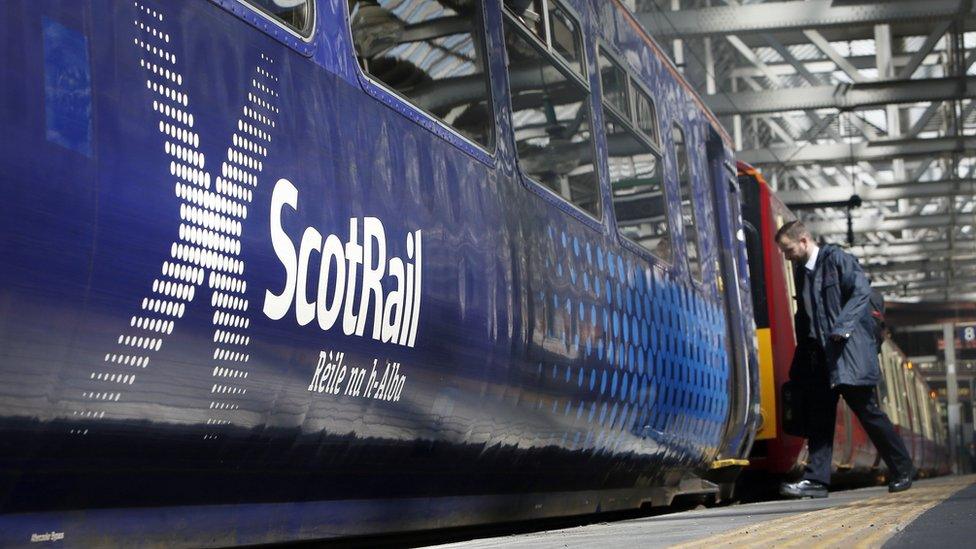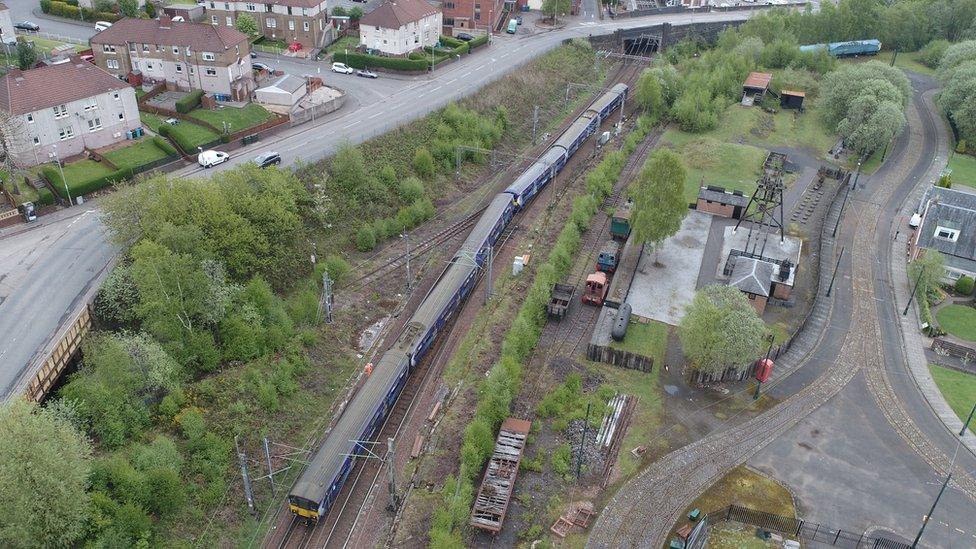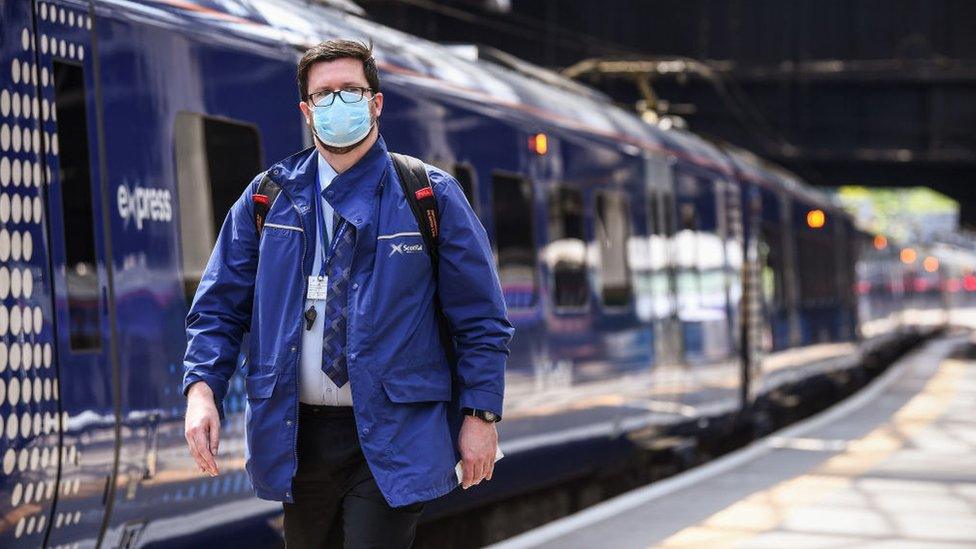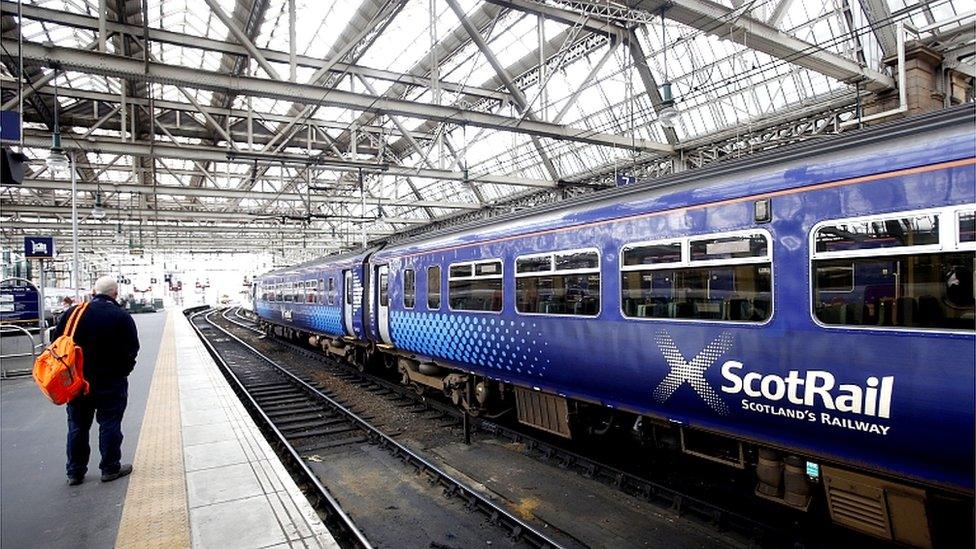Rail passengers face Sunday disruption in pay dispute
- Published

Rail passengers in Scotland could face weeks of disruption on Sundays in a union pay dispute.
ScotRail, which was nationalised last month, had been relying on overtime working on Sundays due to delays in training new drivers.
Last Sunday driver shortages affected 110 services across the country.
Aslef denied suggestions that drivers had staged unofficial strike action but it has now balloted its members after rejecting a 2.2% pay offer.
Unless there is a breakthrough, it is understood that the scale of disruption this weekend will not be clear until late on Saturday, as planning teams attempt to source driver cover.
David Simpson, ScotRail service delivery director, said: "It is very disappointing that we find ourselves at this stage with Aslef, despite a very good offer being made. We have made a pay offer that recognises the hard work of our colleagues and the cost-of-living challenges faced by families across the country, while delivering value for the taxpayer.
"We are still trying to recover from the pandemic. With customer numbers around one third below pre-Covid levels, it remains a very challenging time for Scotland's Railway.
"We have assured Aslef and our workforce that we remain open and committed to further discussions to resolve the dispute and move forward together to provide the safest, greenest, and most reliable railway we can for Scotland. I ask union members to vote no so we can focus on that recovery."
Mr Simpson said the 2.2% offer for 2022/23 came after three increases in pay between 2019 and 2020.
Jim Baxter, Aslef executive committee member for Scotland, said that Sundays are booked working days but they do count as overtime.

Jim Baxter, Aslef executive committee member for Scotland, is seeking more than ScotRail's 2.2% pay offer for his members
He told BBC Radio's Good Morning Scotland programme on Monday: "Drivers whose days off were on Sunday chose to take those days off and spend that time with their families."
Mr Baxter said that jobs that did not have drivers booked for them, due to holidays or sickness, were not covered as no one else was available to work them.
The union has criticised ScotRail's pay offer and called on the operator to put a "more realistic" deal on the table.
Mr Baxter said his members felt "undervalued", especially given the challenges they face at work, notably from anti-social behaviour.
On Wednesday, Aslef's national executive confirmed it had made the decision to ballot members within ScotRail after the company failed to make a meaningful pay offer
'No option'
Scottish Organiser Kevin Lindsay said: "We are beyond disappointed by the lack of action and any meaningful pay offer from ScotRail.
"Just a few weeks ago we were celebrating our trains being taken back into public ownership, we hoped this would herald a new era of positive industrial relations, but it appears the same senior managers are determined to resort back to the failed strategies of the past."
Mr Lindsay added it had been left with "no option" to ballot its members and urged ScotRail and the Scottish government to get back round the negotiating table.
He said: "We are determined to ensure that our members, the key workers who kept the railways going throughout the pandemic are rewarded appropriately and that their pay reflects rising inflation and the cost of living pressures they face."
Last weekend passengers also had to deal with the fallout from a derailment in Coatbridge on Friday, which caused track damage, and affected 120 services.
Sunday was the first day the driver shortage has posed a significant challenge.

An aerial picture of the Coatbridge derailment which caused considerable disruption to weekend train services
Last month ScotRail went back into public ownership for the first time in 25 years. Previous operator, Abellio, had its franchise ended early amid criticism of the quality of the service.
The train operator is now being run by a company owned by the Scottish government. Transport Scotland said Sunday services were an operational issue for ScotRail.
On the issue of pay, a spokeswoman said the transport minister has held frequent meetings with union representatives in recent months and understands the desire to negotiate a fair settlement for their members.
She added: "Rail unions are aware any additional increase above public sector pay policy amounts have a clear process which must be followed which includes Cabinet approval.
"Non-driving staff have already received the previously negotiated and agreed 2.2% increase for this year, while negotiations continue with both ASLEF and the RMT.
"It is our intention for ScotRail and its staff to benefit from the transition to public sector control and that is why we would call on everyone involved to take time to consider all options carefully."

The Scottish government took over ScotRail from Abellio on 1 April
The driver pay deadlock comes at a challenging time for Scotland's railways.
In February ScotRail said its peak-time commuter services will not return to pre-pandemic levels - despite 150 services being added from May.
The rail operator previously announced it would drop from its pre-Covid number of 2,400 services a day to 2,100.
It said the move was in line with new travel patterns and overcapacity on some routes.
That figure has now been revised, but returning services will be during the day rather than at traditional peaks.
Last year the rail operator's "Fit for the Future" , externaldocument sets out proposals for public transport as the country emerges from the Covid pandemic.
Discounted tickets
Passenger numbers plummeted during the pandemic as thousands swapped their daily commute for home working.
In a bid to bring customers back Scotland is cutting the price, external of all off-peak tickets by 50% from Monday until Sunday 15 May.
The discounted tickets cover travel up to 31 May.
Transport Minister Jenny Gilruth said the deal is designed to offer people an alternative at a time when people are struggling due to the cost-of-living crisis.
She added: "Clearly there is more to do to make rail travel more affordable all year round and our fair fares review will look at the cost of travelling on all modes of public transport."
Related topics
- Published1 April 2022

- Published9 February 2022
